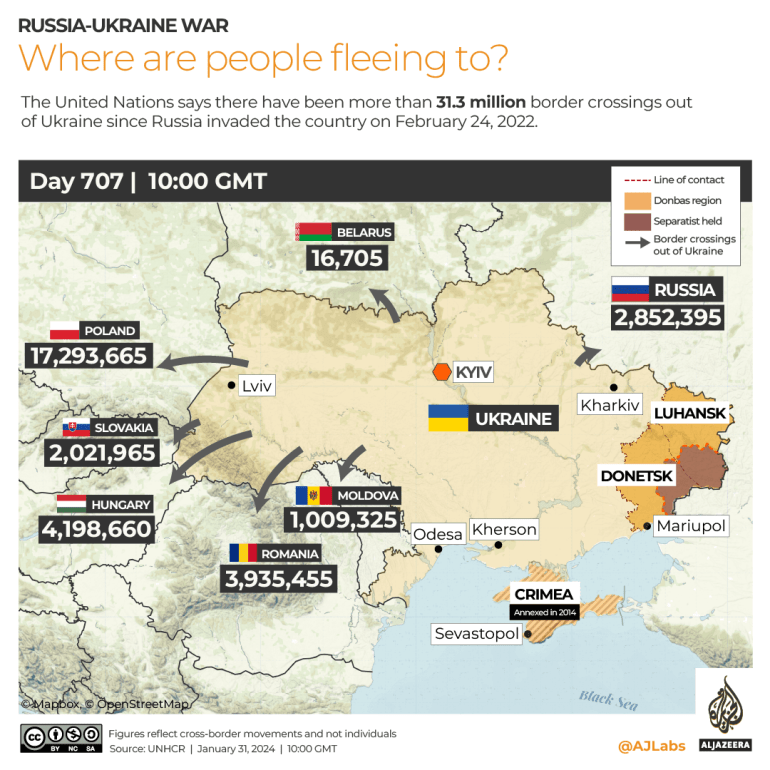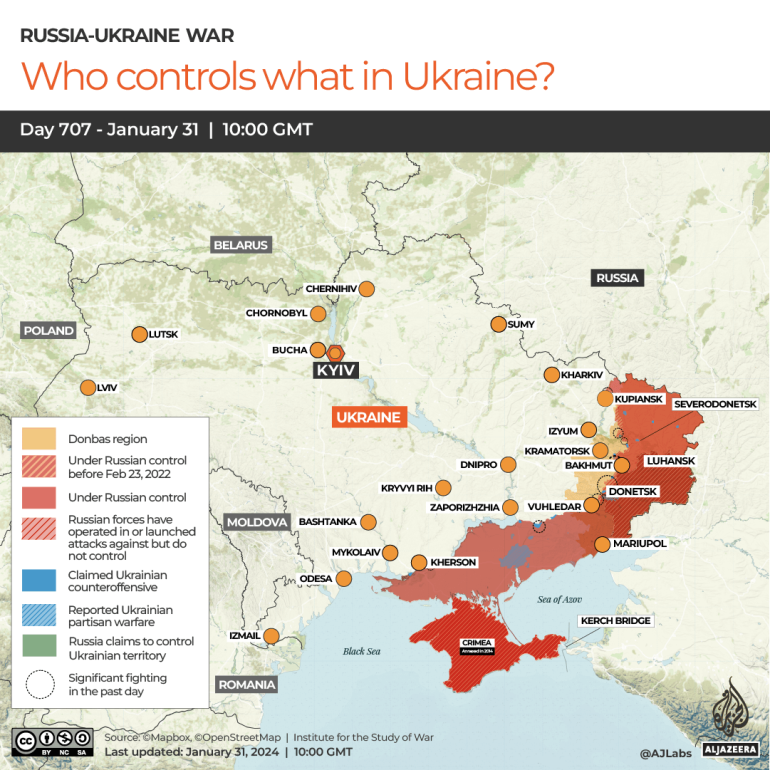As Dmytro Suslov was walking his dog on February 24, 2022, shortly before five a.m., he discovered the first rocket impacts above him, which marked the beginning of Dmytro Suslov Russia’s large-scale invasion of Ukraine. His heart pounded with fear as he contacted family and friends to find out her whereabouts.
Since that day, “sustained explosions, air raid sirens, the noise of rockets flying over the city, the fire of heavy weapons, the whistling of mines and terrible news” have been part of the tech entrepreneur’s everyday life. However, leaving home and family behind was never an option – and that remains the case despite the current escalation of the war.
“As Russian attacks on our cities intensify, my stance on remaining in Ukraine remains unchanged,” Suslov told Al Jazeera. “Of course it puts pressure on each of us, but personally I’m not afraid.”
In the decade leading up to the war, Suslov had sold software from a Russian company to Ukrainian companies. The decision to stop working with this company was made immediately when the products suddenly became associated with the attacking country.
“It was a values-based decision and I made it without hesitation,” he said.
Given his expertise in the technology industry and his MBA-level education, Suslov thought about his career options. “I don’t think I had the dream of becoming an entrepreneur, but given the circumstances, I went for it [in starting a business] alongside new business partners,” Suslov said, referring to the process that led to Uspacy, the digital corporate workspace developer founded in the year the war began with Spartak Polishchuk, Volodymyr Pimakhov and Kyrylo Melnychuk.
Companies like Uspacy and others like Grammarly and MacPaw are part of a thriving tech sector that was the country’s top services export in 2023, according to a study by the Lviv IT Cluster and the United States Agency for International Development (YOU SAID).
This is a bright spot in an otherwise challenging economic landscape: According to Ukrainian Economy Minister Yulia Svyrdenko, the country’s total export value fell 18.7 percent last year compared to 2022, the lowest in a decade.
Uspacy has benefited from support from the Ukrainian government through tax incentives, ties to the Ukrainian Startup Fund, and international exposure through the USAID program. The company has also developed new ways of working, but the complexities of war can take their toll.
“I lost power and internet and mobile communications were unstable for some time. “Most of the employees were hiding in bomb shelters or staying away from windows between two walls at the time of the attack,” Suslov recalled of the attacks in early January.
“Of course, working under such conditions was impossible. But as soon as we heard the air raid alarm going silent and made a roll call to make sure everyone was OK, we immediately got back to work,” he added.
While tech founders like Suslov have chosen to stay and weather turbulent times, the industry has also seen a significant amount of churn. The number of Ukrainian tech experts living abroad increased by 20 percent last year, reaching 65,000 professionals in 2023, according to the Lviv IT Cluster study.
This is part of a larger trend impacting the country, as noted by the United Nations High Commissioner for Refugees 6.3 million people of the country’s 36.7 million inhabitants left Ukraine in January.
Dealing with uncertainty
Victoria Repa, CEO and founder of BetterMe, a wellness startup founded in 2016, fled after waking up to explosions in her Kiev apartment on the day the war broke out. “[The decision to leave was due to] Uncertainty about tomorrow and the near future,” said Repa, who traveled across Europe before his trip to Poland.
Despite being immersed in ambivalence and fear for the second time and experiencing war-related unrest – Repa was a student at Donetsk University when the invasion of Donbass began in 2014 – Repa sought to protect her growing company and its workforce of over 500 employees from remaining 80 percent in Ukraine.
“I have overcome difficult moments by defining a mission and moving forward. “I realized that business is crucial to supporting the economic frontier and Ukraine needs it like never before,” says Repa.
This included investing in equipment such as generators, batteries and Starlink internet to keep the company running. “There was no guarantee that infrastructure attacks would not impact business ability: electricity, internet, water and gas supplies are all vulnerable to attack,” she told Al Jazeera.
Other concerns included implementing emergency measures to move team members to safer locations alongside technical equipment, as well as ensuring stable service for the company’s 150 million users worldwide.
But running a business in a war scenario is far from easy, and one particular episode before a BetterMe product presentation at a business conference illustrates the ongoing struggle.
“My presentation was being prepared when massive rocket attacks began across Ukraine, leaving half the country without power and internet access,” Repa said.
The mindset in these situations is to find ways to get things done despite scenarios of “uncontrollable stress and chaos,” he said. “Our experience shows that creativity and innovation can thrive even in the darkest times,” she said.
Maintaining her own mental stability and energy levels was also crucial, the founder emphasized. “[My priority is to] Bring stability and control back to the team. Face fear, create and communicate worst-case scenarios to prevent total system failure. The [focus] is to face and overcome all anxiety-provoking situations,” she added.
Ensuring business continuity
The mindset of Ukrainian founders is not just about coping, but also about strategic planning for the future. For Oleg Panchenko, founder of software development agency FreySoft, moving to Poland after a short stay in the UK was about personal safety, but also a business continuity measure.
“We could not offer new project work to Ukrainian developers – [companies] said they would be happy to work with them if they were based elsewhere in the European Union, but would not take any risks if [contractors] were based in Ukraine,” he said.
The shift led to a gradual globalization process for FreySoft, which became fully Ukrainian in 2022. Now half of the company’s 80 employees come from other countries, and Panchenko diversified his ventures with MakeDeal, an HR productivity tool, and FreyStaff, a staffing system powered by artificial intelligence.
Although Panchenko and his family were forced to leave their homeland, they have decided not to view life in Warsaw as a mere stopgap. “We live life ‘now’ instead of postponing it to the future, and I hope that those who have left our country and are living abroad will also accept their current life,” the founder said, adding, he still not sure if he would return.
“A lot has changed for me personally and in Ukraine since I left. I would like to move back into my home as soon as possible, but so far I don’t see any options in this regard,” Panchenko said.
“Reconstruction of Ukraine”
Despite their different approaches to life and business and their unique challenges, Ukrainian founders agree that they are optimistic about what lies ahead. For BetterMes Repa, returning to Kiev after the end of the war is a priority. “The technology sector will be the basis for the reconstruction of Ukraine,” she says.
For FreySoft’s Panchenko, there is ongoing change in the industry as many companies, including his own, move from providing technology services to developing products. “This change leverages Ukraine’s existing talent pool and I believe our products will flourish globally,” he says.
The initiatives of governmental and non-governmental organizations focused on Ukraine’s future and its image in the world will be instrumental in leading the tech scene and its founders towards a better future, says Uspacy’s Suslov. “I am pleased that despite the war, Ukraine is taking fundamental steps to build a startup ecosystem that the world should know,” he said.








Recent Comments